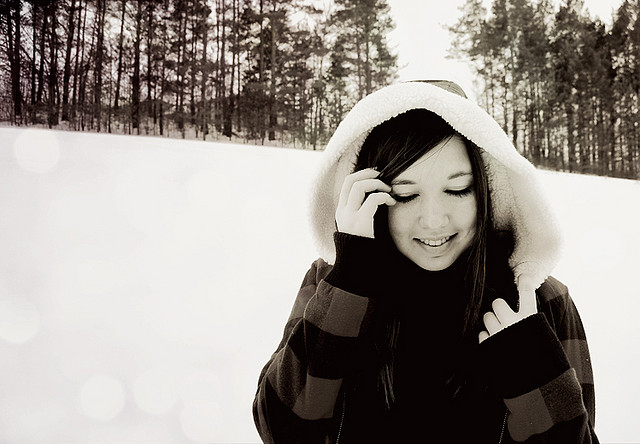“Happiness is whatever you want it to be.” ~Scrooge in Scrooge: The Musical
It seems there are about as many definitions of happiness as there are people who spend any time talking about it.
But some of the definitions leave us wondering whether we would even recognize the thing if it were to hit us between the eyes in broad daylight.
Competing Definitions
Wikipedia partly defines it this way: “Happiness is a mental or emotional state of well-being characterized by positive or pleasant emotions ranging from contentment to intense joy”.
Sigmund Freud’s definition of happiness was centered in the Pleasure Principle, that satisfying needs, and thereby experiencing the pleasure gained by their satisfaction, is the highest form of happiness.
Aristotle claimed that happiness in the highest sense is a contemplative life.
Coca Cola has even jumped into the game by defining happiness as “anything that can bring a smile to someone’s face.” And, by the way, they remind us they have just the product to put it there!
Happiness, it seems, has become a pretty nondescript term with unclear parameters, unspecified causes that lasts for undetermined amounts of time.
The Problem with Imprecision
Of course, the problem with imprecise language is that it confuses the process of obtaining the thing the imprecise words try to describe.
It’s like giving directions by telling a lost driver to go straight for a while, turn at some point, drive some more and turn again somewhere in the foggy distance.
Not particularly helpful.
Words have meaning. But if the meaning has been diluted or is overly vague and nondescript, those wanting the thing the term represents (happiness) will likewise have a difficult time finding it.
So if the same term describes both the “pleasant emotions” we get when eating a slice of New York cheesecake and the feelings of accomplishment that living our lives with meaning and purpose generates, the term is no more meaningful than calling anything with chocolate in it a cookie.
What Happiness is Not (debunking cultural myths about happiness)
Before getting started on the definition, however, it’s helpful to first understand what happiness isn’t. When there’s too much debris in the road, a souped up engine just won’t get you where you want to go. We first have to clear the rubble.
Since there is so much misinformation taught by well-intentioned advice-givers, it’s necessary to spend some time cleaning the glass before looking through it.
1. Happiness is not the result of fame or fortune
Happiness cannot be purchased. No bank account is large enough to buy it. The only relation wealth has to happiness, in fact, is in having enough to remove the financial obstacles to it by reducing the stress of wondering how bills will be paid, food put on the table and eviction notices avoided.
Beyond that, money and happiness are only marginally connected.
The perfect house in the perfect neighborhood with the perfect kids playing on the perfect lawn may create a sense of excitement, pride or satisfaction for a time.
But those feelings are short-lived and will fade as the thrill of the perfect home are replaced with insecurities and dissatisfactions with other (mostly internal) parts of life. What was once new becomes common, no longer able to mask the internal conditions of the heart.
Besides, happiness is a much more tenacious thing that sticks to the deepest parts of our lives and is independent of most circumstances, conditions and experiences. Wealth can provide a shiny polish to happiness, but can’t plant the substance of it in the heart when it has not yet grown there by other means.
2. Happiness is not the same as fun or pleasure
Happiness should not be confused with the circumstantial sensations of pleasure or excitement, fun or even enjoyment. Certainly happy people experience all such feelings, and feel them more purely and frequently (since more of life is fun and enjoyable to happy people). But such things don’t define happiness.
Fun and pleasure come and go as fleetingly as the activities that produce them. But happiness is long-lasting, a condition of the soul, the foundation on which the circumstances of life are experienced, endured, or enjoyed.
Now we’re closer to a definition of happiness, but not quite there yet. Knowing the ingredients in a cake does not fully tell us what a cake is. But knowing the ingredients helps us understand what’s beneath the frosting. Similarly, while the ingredients to happiness are not its definition, it gets us closer to one.
3. Happiness is not having everything you want
Happy people tend to be those who take pleasure in simple things. They are easily pleased and are grateful for even the smallest blessings. They appreciate what the unhappy may find annoying or offensive.
It’s not so much what you have that makes you happy, but how much you appreciate what you have, no matter how much or little it is.
If happiness was a reflection of having everything you wanted, Hollywood and the music industry would be peopled with the happiest people in the world. But just a glance at the tabloids will tell you that’s not the case.
What Happiness Consists of (a 3-part description)
Just as a description of a crime suspect can help police identify a thief, knowing the characteristics of happiness likewise helps us get closer to our definition.
1. Happiness is a state of being
Happiness is a quality of life more than a particular emotional response to a particular event or set of circumstances. It is the condition of who we are and how we think and what we believe and how we live.
As such, happiness is not necessarily the result of getting everything we want or having everything go our way. As a matter of fact, there are plenty of happy people who are going through some very challenging times in their lives.
This is only possible when we realize that happiness is something we take with us into life rather than something that happens to us by life. Happiness is not, therefore, a fleeting shadow, but a predictable characteristic of the way we live. It’s the difference between feeling happy and being happy. One describes a moment. The other describes a person, a state of being.
In short, happiness is what happens quite naturally when who we are and how we think are fundamentally in harmony with the principles that create it. Happiness is not so capricious as to come and go without rhyme or reason. It lingers, the constant that underlies (and reveals!) the quality of our thoughts, attitudes, presuppositions, interpretations, perspective, actions and character.
2. Happiness is not a one-size-fits-all proposition
Happy people are not necessarily those who laugh the loudest. They are not always the most active. Or those who live the most adventurous lives or have the most FB friends.
Happiness is experienced differently by different people. We all have a wide range of different tastes, predilections, personalities and natural emotional set-points that influence how happiness will be uniquely experienced.
Some people are more sedate and calm in their personality. That doesn’t necessarily mean they are less happy, only that they show it less effusively. They may simply express their joy in less obvious or flamboyant ways, characterized more by contentment, peace and soul-satisfaction than gut-busting laughter and heart-pounding excitement or effusive, gregarious engagement.
The bottom line is that happiness should be defined less by the way it’s expressed, as by the qualities that produce it and the duration or regularity with which it is experienced and by the internal climate our thoughts, beliefs and attitudes produce.
3. Happiness is the sustained natural condition of living life well
Happiness is the result of the thoughts we have come to habitually think, the attitudes we harbor, the beliefs we’ve consciously and unconsciously accepted as true about the world, life, others, ourselves, what we expect from life and others, and how we interpret what we experience.
It is also influenced by the person we are and are becoming, our character and values and conscience. When these elements are in harmony, happiness becomes the natural byproduct of that kind of life.
(These character traits are at the basis of a happy life. Click over to see how you measure up! Which ones are you lacking? Which are your strongest qualities?)
Happiness Defined
So where are we now after spending about 1,500 words on the subject to this point? Well, my first goal was to clear the debris of false impressions and misguided definitions to happiness. The next was to set some happiness parameters, or identify some of the qualifying characteristics of a happy life.
Still, I need a definition, right?
So here it goes: Happiness is the emotional state (whether relatively sedate or effusive) that lifts and inspires, expands and extends life and the joy of living. It is the underlying state of inner peace, optimism and gratitude that extends itself in love and confidence and is reflected in a decent life of purpose and meaning. Happiness is the state of feeling good about the track you’re on, the direction you’re pointed and the quality of life you’re living.
I trust my definition will never make it into Merriam-Webster. But it’s still a good, even if lengthy, definition.
What’s yours?
Chime in!
What parts of happiness do you identify (or struggle) with? What would you add to or change in my definition? Please comment below. No, seriously. Just scroll down and leave your thoughts and experience with happiness. Go on. You know you want to…








































Wow… It’s a great article. Happiness is one of the most important feelings in our life, but a lot of people are not happy. Your article can help people to learn how to be happy 😉
Marko Zupanic recently posted … How to improve self confidence? Become a better, more successful, more powerful!
To me, happiness is the lack of worry or pain. Most people chase happiness expecting it to feel like some sort of manic, drug-fueled high, and end up being chronically unhappy because they never find that “happiness”.
Mercury recently posted … How To Stop Overthinking: Is It Even Possible?
I realize after reading your article I am a HAPPY person. I agree Happiness is not achieved from material items. Abundance creates choices which can create confusion. I am at that moment in my life. I realize the only thing certain in this world is uncertainty. When I turn if over to my higher power the miracle of life will happen. I am struggling to enjoy where I am right now.I need to slow down and enjoy the treasures of the trip.When I concentrate on my personal progress, the difficulties over which I have no control will iron themselves out. I realize that such surrender is not weakness but strength that will reinforce my courage and confidence. Total self love and acceptance is the only foundation for happiness and the love of others.
A really eye opening post, especially during the holidays! Happiness is subjective but your definition is right on track.
Beautifully written post. Happiness is not the absence of challenges, trials and problems in life, but it is knowing how to deal with all of these that makes life meaningful and colorful. Great post.
Just loved the definition…happiness is for me a good book, an article or idea that gives me a thousand mental somersaults, my happy place is when I am dancing or listening to music,everything else just goes away…a moment of silence and I feel God’s helping hand in my life…
Amazing! what a great article. All the points are fantastic and meaningful. I also feel that happiness improves people’s personality.
What do you think of the reductionism of happiness most accurately being hedonism? Do you think hedonist values are more central to the notion of happiness than abstractions like security, peacefulness, etc?
Harvey Meale recently posted … What Should We Be Teaching in Schools?
What an interesting question, Harvey. Thank you for asking it here. Actually, there has been a growing body of research on just that issue and virtually all of it points to the same thing. Hedonism leaves the hedonist feeling empty at the end of the day.
A branch of psychology called positive psychology has spearheaded an increasingly scientific approach to the study of what makes us the happiest. It turns out that habits of gratitude, optimisms, meaningful service and self-improvement are at the top of the list.
I would recommend picking up any of Martin Seligman’s works for a more exhaustive explanation. Seligman is the psychologist who really began the positive psychology movement.
Thanks again for the question.
Interesting. I wonder if the hedonist’s emptiness is a result of their hedonist tendencies or if there’s another factor causing it. I might just have to grab a Seligman book and have a further look! Thanks for the great reply.
Harvey Meale recently posted … All Ideology is Toxic